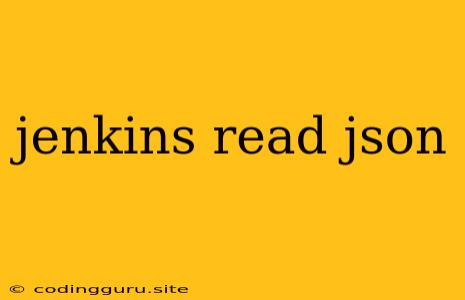How to Read JSON Data in Jenkins Pipelines?
Jenkins is a powerful automation server widely used for continuous integration and continuous delivery (CI/CD). It allows you to automate build, test, and deployment processes for your software projects. Often, you'll need to work with JSON data within your pipelines. This could be data from an API, configuration files, or even test results. This guide will walk you through the process of reading JSON data in Jenkins pipelines.
Understanding JSON
Before we delve into reading JSON data, let's understand what JSON is. JSON (JavaScript Object Notation) is a lightweight data-interchange format that is human-readable and easy to parse by machines. It's commonly used for transmitting data over the internet, especially in web applications and APIs.
Reading JSON Data in Jenkins Pipelines
Jenkins provides several ways to read JSON data within your pipelines. Let's explore some common approaches:
1. Using the sh Step and jq
The jq command-line tool is a powerful JSON processor. It allows you to manipulate and extract data from JSON documents. You can use the sh step within your Jenkins pipeline to execute jq commands and process JSON data.
Example:
pipeline {
agent any
stages {
stage('Read JSON') {
steps {
sh 'echo "{"name":"John Doe", "age":30}" > data.json' // Create sample JSON file
sh '''
jq '.name' data.json
'''
}
}
}
}
This pipeline creates a sample JSON file (data.json) and uses jq to extract the value of the name field.
2. Using Groovy and the JsonSlurper Class
Groovy provides a convenient JsonSlurper class that makes it easy to parse and process JSON data directly within your pipeline code.
Example:
pipeline {
agent any
stages {
stage('Read JSON') {
steps {
script {
def json = new JsonSlurper().parseText('{ "name": "Jane Doe", "age": 25 }')
println json.name
println json.age
}
}
}
}
}
This example uses JsonSlurper to parse a JSON string directly and then access its properties.
3. Using the Rest API
If your JSON data is hosted on a web server, you can access it directly using the Rest API. Jenkins allows you to make HTTP requests using the http step.
Example:
pipeline {
agent any
stages {
stage('Read JSON') {
steps {
http request: 'GET', url: 'https://api.example.com/data', contentType: 'application/json',
response: 'data',
// Access the JSON data from the 'data' variable
script {
def jsonData = new JsonSlurper().parseText(data.content)
println jsonData.name
println jsonData.age
}
}
}
}
}
This example fetches JSON data from an API endpoint and then parses it using JsonSlurper.
Handling Errors
It's important to handle errors that might occur when reading JSON data. This could be due to issues with the JSON file, network problems, or invalid data.
Example:
pipeline {
agent any
stages {
stage('Read JSON') {
steps {
try {
sh 'jq .name data.json' // Assuming 'data.json' exists
} catch (Exception e) {
echo "Error reading JSON: ${e.message}"
}
}
}
}
}
This example includes a try...catch block to handle potential errors when reading JSON data using jq.
Common Scenarios
Here are some common scenarios where you might need to read JSON data in your Jenkins pipelines:
- Retrieving configuration data from an external source: You can store configuration settings like database credentials or API keys in a JSON file and use it in your pipeline for dynamic configuration.
- Processing test results: JSON is often used to store test results in formats like JUnit reports. You can read this data to analyze and report on the test outcomes.
- Interacting with APIs: Many APIs use JSON for data exchange. You can read JSON data returned from APIs to perform actions like creating or updating resources.
Conclusion
Reading JSON data within your Jenkins pipelines is a common requirement for various automation tasks. By leveraging tools like jq, Groovy's JsonSlurper class, or the Rest API, you can seamlessly access and process JSON data in your pipelines. Remember to handle errors gracefully to ensure the reliability of your automation processes.
